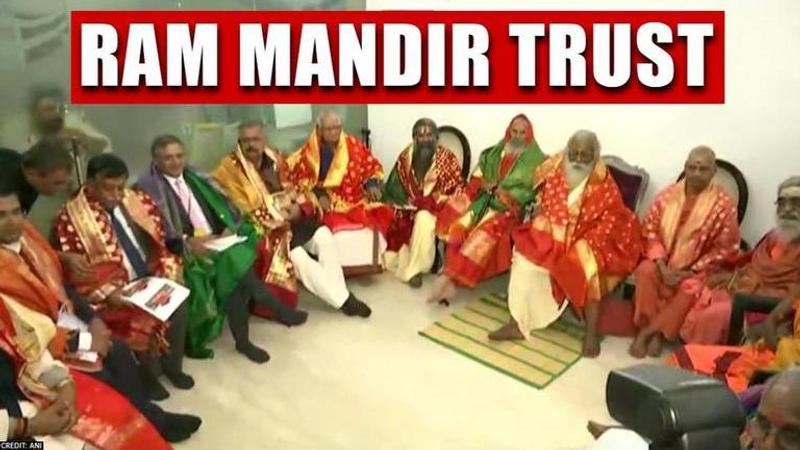Published 22:42 IST, February 19th 2020
Ayodhya Ram Temple Trust: Nritya Gopal Das elected President, Champat Rai Gen Secy
During the first meeting of the Ram Mandir Trust, Mahant Nritya Gopal Das was elected as the President of the Shri Ram Janmabhoomi Teertha Kshetra Trust

During its first meeting on Wednesday, Mahant Nritya Gopal Das was elected as the President of the Shri Ram Janmabhoomi Teertha Kshetra Trust. The meeting was held in the national capital to formulate plans for the construction of Ram Temple in Ayodhya. Champat Rai was elected as the General Secretary and Shri Govindji Giri Dev was named the Treasurer of the Trust The meeting was held at the residence of K Parasaran, the head of the trust.
Speaking to the media Nritya Gopal Das said, "People's emotions will be adhered to. The temple will be constructed as soon as possible."
In other key decisions, Prime Minister Narendra Modi's former principal secretary Nripendra Misra was handed over the charge to head the temple construction committee of Ram Janmabhoomi Trust. The trust was constituted by the government after a Supreme Court verdict on the Ayodhya land dispute case in November last year.
Ram Temple trust
On February 5, Prime Minister Narendra Modi announced the formation of the trust in Lok Sabha, nearly three months after the SC ruling on the Ayodhya land dispute. The Shri Ram Janmabhoomi Teertha Kshetra Trust has seven members, five nominated members, and three trustees.
The members of this Trust include senior lawyer K Parasaran, Jagatguru Shankracharya, Jyothishpeethadheeshwar Swami Vasudevanand Saraswati Ji Maharaj from Allahabad, Jagatguru Madhavacharya Swami Vishwa Prasannatheerth Ji Maharaj, Pejawar Math in Udupi, Yugpurush Paramanand Ji Maharaj from Haridwar, Swami Govinddev Giri Ji Maharaj from Pune and Vimlendra Mohan Pratap Mishra from Ayodhya.
Besides, the following will also be the trustees, Anil Mishra, a homeopathic doctor from Ayodhya and Kameshwar Chaupal from Patna who is a Scheduled Caste member, and Mahant Dinendra Das, Nirmohi Akhara, Ayodhya Baithak.
Ayodhya Verdict
Putting an end to the decades-old case, a five-judge bench of the Supreme Court in November, ruled unanimously in favour of building a Ram Temple in the disputed site. It said the entire disputed land spread over 2.7 acres will be handed over to a trust formed by the government, which will monitor the construction of Ram Temple at the site. The court had directed the government to give 5-acre land to Sunni Waqf Board in Ayodhya for the construction of a mosque.
Ranjan Gogoi, the then Chief Justice of India presiding over the panel of judges, said it was not the court’s job to rule on faith or politics, but that "as a secular institution (it) should uphold all faiths and religions." In 1994, the Supreme Court had held that the act of demolition of the mosque in 1992 was a 'national shame' and that it shook the faith of the minorities in the rule of law and constitutional process," it said.
Updated 22:42 IST, February 19th 2020




